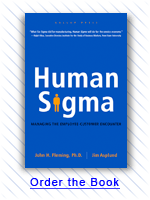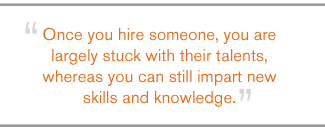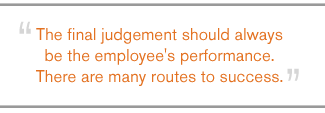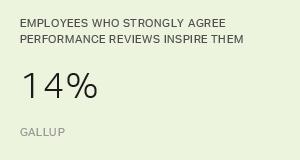One means of improving productivity and engagement in your workplace is to replace struggling employees with better ones. There are many wrong or harmful ways to do this, but there is a method that works if applied with diligence and care.
 |
First, let's cover [one] of the less successful ways. [A] well-known method for changing the talent of an organization is the forced stack-ranking and purging of employees perhaps most commonly associated with Jack Welch and GE. We have found this to be one of the laziest manifestations of performance management. [See "Evaluating Employee Performance (Part 2)" in the "See Also" area on this page.] We will focus here on contrasting this "de-selection" approach with an approach based on an understanding of employee talents and how it can be used to reliably hire new employees in a way that obviates the need for regular purges.
When we talk about "talent," we mean those natural tendencies that exist deep within us. These are the aspects of our personality or behavior most resistant to change. This is a much more precise usage of the word "talent" than is generally meant in common parlance where one's natural abilities and traits are considered together with acquired skills, experience, and attitudes.
Our research shows that some traits do not change much over time. There is ample evidence supporting the genetic or developmental basis for many of these traits. Does this mean that a given talent or trait is absolutely fixed? Not necessarily. But it does mean that our genes and our physical and social development all impose some boundary conditions on what we either can or choose to learn easily. In some respects, those relatively fixed talents are what define us as individuals in that they represent the product of all the billions of choices and circumstances that brought us to the present moment.
In hiring and managing individual employees, it's important to understand what is difficult to change (talent) and what is more easily changed or acquired (knowledge and skills). Once you hire someone, you are largely stuck with their talents, whereas you can still impart new skills and knowledge. Without a clear understanding of these two different aspects of ability, you will have an incomplete picture of how talents play into hiring decisions and could become more prone to making hiring errors.
 |
Consider, for instance, an example from education research. Students with more ability often report studying less than, yet perform better than, their less-gifted peers. Given two students of equal ability, however, the one who exerts more effort performs better.
If we ignore study habits, we might be tempted to think performance is all about raw talent. If we ignore that raw talent, we might be tempted to think performance is instead all about effort. But when we remember to consider both aspects, we begin to understand how talent and effort contribute to results in combination.
We have met resistance to using a talent-based selection method in a number of organizations. The objections to this approach generally fall into one of three categories. Talents, the objectors contend, cannot be perfectly identified; they are not fixed; and we all have talent and can do anything we want to if we work hard enough. We will now consider each of these objections in turn.
Talents cannot be perfectly identified
Though it's true that talents can't be perfectly identified, this is not saying much. There are a many things in life that we can't perfectly distinguish yet are perfectly useful to do. Selection instruments are not accurate enough for certainty, but they are reliable enough to have practical usefulness. This is no different from the clinical evidence for pharmaceuticals and medical procedures -- often, they are not 100% effective either, especially when used incorrectly.
Talent assessments need to be used intelligently with an understanding of the domains of talent one is trying to address and the accuracy with which one can measure them. If this is done, a well-constructed and psychometrically sound selection interview will reliably predict how job applicants will perform.
Two major studies of selection interviews have been published since the mid-'90s. In each study, hundreds of independent studies were aggregated, and we found that individuals with high interview scores had higher performance, whether measuring that performance in terms of sales volume, production records, or supervisor ratings. The interview scores did not perfectly predict performance, but they did a good enough job to be extremely useful.
Talents are not fixed
Performance is not merely a function of talent. Performance is also dependent on motivation and experience, on how a person is managed or led, and on having the right materials and equipment to do the job at hand. Talent, employee engagement, and experience are interrelated, and together have a multivariate relationship to performance.
But this does not imply that our core talents are not stable over time. There is growing evidence that we develop stable traits at relatively young ages, and that personality traits at a broad level are universal across a wide array of cultures.
We must also emphasize the importance of "practice." Having an exceptionally powerful talent does not invalidate the need for practice that will refine the talent so it can contribute to the consistently near-perfect performance of strength. In fact, highly-talented individuals who practice excel more often than less-talented individuals who practice a similar amount. To use a familiar example, Mozart's hard work paid off a lot more for him than it would have for an average music student because Mozart had more intrinsic passion and talent for music than most, and because his father constantly motivated him to attend to that passion and talent.
 |
Examples like this prove particularly fascinating in light of some recent research into the neuroscience of music. "Music is among the most distinctive features of the human race," writes Daniel J. Levitin. "No known culture now, or anytime in the past, lacks music, and some of the oldest artifacts from archeological digs are musical instruments."
As such a universal human endeavor, music serves as a good example of how our talents develop under different circumstances. Levitin points out that memory and a person's emotional involvement in the instrument he is striving to master play a crucial role in developing expertise.
Neurochemical tags associated with memories mark them for importance, and we tend to code as important things that carry with them a lot of emotion, either positive or negative. . . . Caring may, in part, account for some of the early differences we see in how quickly people acquire new skills. . . . It's impossible to overestimate the importance of these factors; caring leads to attention, and together they lead to measurable neurochemical changes.
Levitin goes on to emphasize the importance of practice and that it takes 10,000 hours of practice to truly master just about anything in life.
In study after study of composers, basketball players, fiction writers, ice skaters, concert pianists, chess players, master criminals, and what have you, this number comes up again and again. . . . Of course, this doesn't address why some people don't seem to get anywhere when they practice and why some people get more out of their practice sessions than others. But no one has yet found a case in which true world-class expertise was accomplished in less time. It seems to take the brain this long to assimilate all that it needs to know to achieve true mastery.
This argument in favor of practice has led many to believe that it's the sole route to success, whether great talent exists or not. But this is an incorrect understanding of the way our minds work. Though practice is essential to the building of mastery, it's not enough by itself. Some people just get more from that practice than others do. For example, both of the authors are musicians and have experienced the improvement that comes with practice. But one of us has a sister who is a classical pianist who exhibited more interest and aptitude in music at a very early age. The greater interest spurred her to practice a great deal, and the greater aptitude helped her benefit more quickly from that practice -- so the interest and the aptitude reinforced each other. It was likely the same in our Mozart example above; as Levitin notes, Mozart's father "was widely considered to be the greatest living music teacher in all of Europe at the time," so Mozart's precociousness had assistance in being developed into mastery. Both examples illustrate talent's significant contribution to strength. Without application and practice, talent languishes, and without talent, the practice does not have as much benefit.
Hard work versus talent
Everyone has some stable dispositions that we can evaluate and discuss. But no two individuals share the same array and levels of talents, and some of the talents that are most naturally powerful in a given individual could be the most difficult for that person to change.
Can an individual with low conscientiousness be conscientious occasionally? Sure. Some aspects of personality are dependent on the situation. Many of us can exhibit a degree of discipline when we really need it, but for some of us, it's not a reliable trait.
When we talk about great talents, we are really talking about one's most reliable dispositions, the ones that best represent that person's core personality. These traits can be reliably measured and used to select candidates who are better fits for the job at hand, and thus much likelier to excel.
The benefits of hiring employees using psychometrically valid talent assessments are numerous and substantial. Because a candidate who passes such an assessment has talents that are known to be predictive of success in the job of interest, the odds of this candidate being successful are much higher -- he or she is less likely to quit and more likely to produce superior results. In a recent meta-analysis of selection instruments -- including 55,234 observations from 386 studies --- results showed that hiring the top 20% of candidates recommended on the basis of their talents relates to more than a 20% gain in sales performance per person.
No reasonable amount of training or hard work will likely ever make up for the performance gap that can be attributed to having talents that fit the job. It has been our experience that more talented individuals also learn and adapt faster in situations that fit their talents, so it is likely that additional training and experience will instead widen the performance gap between those with talent and those without.
Understanding the talent requirements of a given job makes it much easier to hire candidates that are likely to succeed in those circumstances. It also helps clarify existing employees' perceptions of the role and the extent to which those perceptions match who they are as individuals. If the role is a good fit talent-wise, then any deficits in performance are likely the result of a lack of skills, knowledge, or experience, all of which can be changed with relative ease. If the role is a poor fit, then deficits in performance may be difficult to overcome, and the employee should find a more suitable position.
The final judgment in these cases should always be the employee's performance. There are many routes to success; talent assessments merely find the most common ones associated with excellence and raise the odds of high performance. This is the best way to think about talent -- as one factor among others, including experience, skills, and knowledge.
